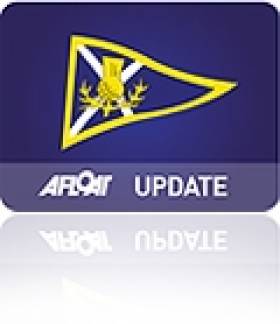Displaying items by tag: CYCA
'Over Complexity' Leads Cruising Yacht Club of Australia to Move to Single Rating Rule for 2023/24 Season
One of Australia's leading yacht racing clubs – and the organisers of the world Famous Sydney Hobart race – will adopt IRC as its single rating rule for the 2023/24 season due to the divergence between IRC and ORC that 'undermines the integrity of the sport of sailing'.
In a statement, the Cruising Yacht Club of Australia (CYCA) says it has decided to adopt a single rating rule for the 2023/24 Audi Centre Sydney Blue Water Pointscore.
"Over the years, IRC and ORCi rating rules have diverged. The complexity and workload for owners and crews in maintaining adherence to both are significant", CYCA says.
According to the Club, "the current situation undermines the integrity of the sport of sailing, races and the Club".
IRC, as the Cruising Yacht Club of Australia's (CYCA) primary rating rule, has good compliance. ORCi, as the Club’s secondary rating rule, is witnessing increasing compliance and data errors. This undermines the integrity of the sport of sailing, races and the Club.
"The reputational risk of continuing with two rating rules and having further compliance issues is too great. Action is required to protect competitors, the Club and its races", the club argues.
In outlining 'path forward', CYCA says is moving to a single-rating rule because:
- It's too complicated and time-consuming for owners to stay on top of two rules.
- The only way to mitigate future compliance issues and the associated negative press is to move to a single rule.
The one rule has to be IRC:
- As the CYCA's current blue water fleet is optimized for IRC, (the rating rule used for the Tattersall Cup), IRC has to be the rule that it consolidates with at this point in time
Consolidating to a single rating rule simplifies the administration, cost and compliance burden on competitors.
It improves the spectator experience with clarity on winners. And it significantly reduces the risk of reputational damage for competitors, the Club and its races.
This move in no way diminishes the importance of the Ocean Racing Congress and ORCi as it will continue to provide one of the two ways in which a boat can demonstrate that it satisfies the stability requirements of the Rolex Sydney Hobart race. Importantly, the CYCA will continue to uphold the highest safety standards in all of its races.
This change will take effect from the upcoming Noakes Sydney Gold Coast Yacht Race and will apply to all races in the 2023/24 Audi Centre Sydney Blue Water Pointscore:
- Noakes Sydney Gold Coast Yacht Race (29 July 2023)
- Flinders Islet Race (Saturday, 23 September 2023)
- Tollgate Islands Race (Friday, 13 October 2023)
- Bird Island Race (Saturday, 11 November 2023)
- Cabbage Tree Island Race (Friday, 1 December 2023)
- Rolex Sydney Hobart Yacht Race (Tuesday, 26 December 2023)
New Courses for All Fleets at Scottish Series
Today (7 January) Clyde Cruising Club, organisers of sailing's Brewin Dolphin Scottish Series, announced exciting developments for the 2011 event. The Scottish Series will see a refreshed offering, both on the water and shoreside, benefitting competitors and spectators a like. The news will be of interest to members of ICRA,
The 2011 Brewin Dolphin Scottish Series takes place over the bank holiday weekend from Friday 27 to Monday 30 May in Tarbert, Loch Fyne in the Clyde Estuary. Three race areas on the broad waters of the Loch will provide separate racing for IRC classes; One Design classes and CYCA classes (with and without spinnakers).
Clyde Cruising Club's main aim has been to provide fresh challenges for competitors, which has prompted changes including:
New courses for all fleets, providing variety to the standard windward/leeward course
The introduction of an Inshore Coastal (daytime) race for IRC classes which will take place during the weekend
Limitations to crew numbers
Some shore based start lines for the CYCA classes
Replacing the IRC sportsboats handicap starts with One Design class starts
2011 introduces a 'Laird of the Loch' event, an invitational competition between 2010 class winners in One Designs which will take place immediately before the Series on Thursday 26 May
Commodore John Watson, who takes over the role from Howard Morrison for the 2011 event, said "This is an exciting time for us, the event and the competitors. Over the last couple years we realised that the event needed rejuvenating and thought it was time to give it a bit of a shake up. Our main aim in changing the event has been to inject more fun and exciting elements of sailing to Tarbert.
"We hope that this refreshed offering will encourage more sailors from across the UK and further afield to consider entering the event and that past competitors will continue to return to the stunning waters of Loch Fyne."
Jamie Matheson, Chairman of Brewin Dolphin, title sponsors of the Scottish Series said "We have been sponsoring the Scottish Series for the past eleven years and think the proposed changes to the event format will offer something new and challenging for competitors."
"Clyde Cruising Club introduced these changes as a result of competitor consultation and it will be interesting to see how the developments influences sailing – it will no doubt make the event more enjoyable for all taking part."
Competitors are being encouraged to sign up early. Further details and race entry forms for this year's Brewin Dolphin Scottish Series are available now from the Brewin Dolphin Scottish Series website.





























































